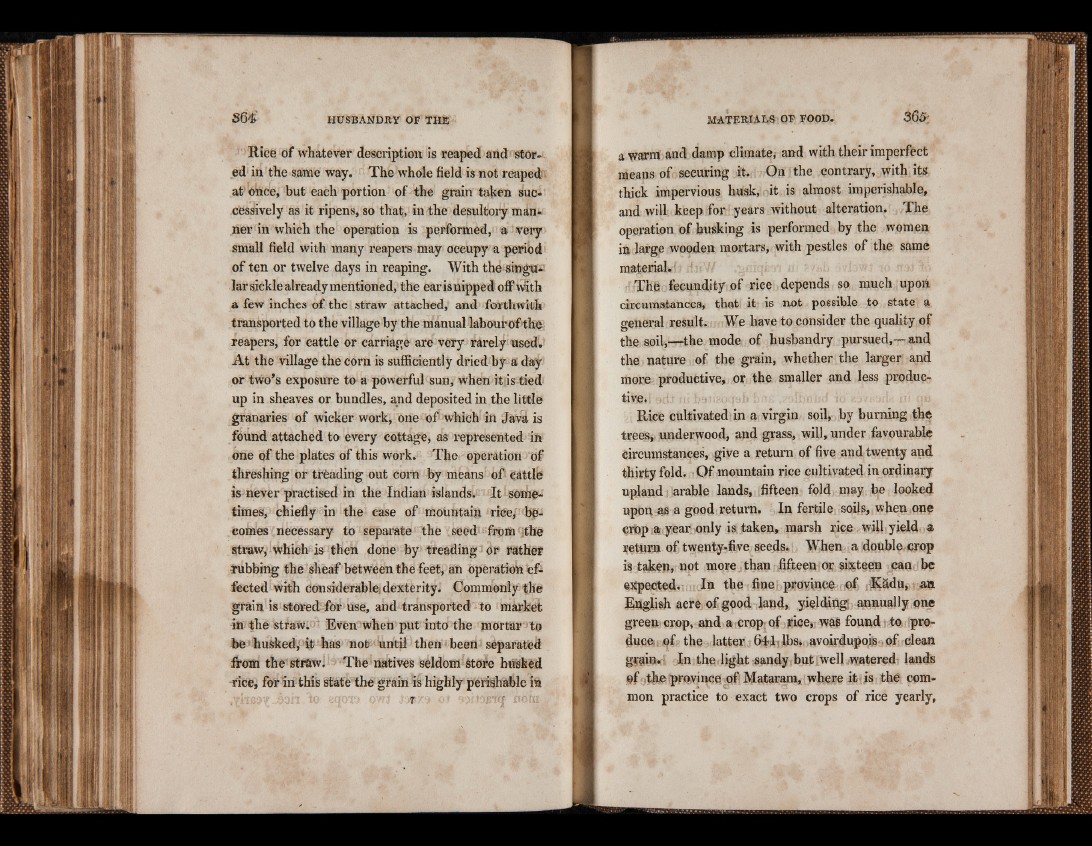
Rice of whatever description is reaped and stored
in the same way. The whole field is not reaped
at once, but each portion of the grain taken successively
as it ripens, so that, in the desultory manner
in which the operation is performed, a very
small field with many reapers may occupy a period
of ten or twelve days in reaping. With the singular
sickle already mentioned, the ear is nipped off with
a few inches of the straw attached, and forthwith
transported to the village by the manual labour of the
reapers, for cattle or carriage are very rarely usedV
At the village the corn is sufficiently dried by a day
or two’s exposure to a powerful sun, when it is tied
up in sheaves or bundles, and deposited in the little
granaries of wicker work, one of which in Java is
found attached to every cottage, as represented in
one of the plates of this work. The operation of
threshing or treading out corn by means of cattle
is never practised in the Indian islands. It sometimes,
chiefly in the case of mountain rice, becomes
necessary to separate the seed from the
straw, which'is then done by treading or rather
rubbing the sheaf between the feet, an operation effected
with considerable dexterity. Commonly the
grain is stored for use, and transported to market
in the straws' Even when put into the mortar to
be husked, it has not until then been separated
from the straw; The natives seldom store husked
Tice, for in this state the grain is highly perishable in
»vhsev ¿ail lc aqoTj ; ■ . r - * \r;rf mtu
a warm and damp climate, and with their imperfect
means of securing it. On the contrary, with its
thick impervious husk, it is almost imperishable,
and will keep for years without alteration. The
operation of husking is performed by the women
in large wooden mortars, with pestles of the same
material.
Xhb fecundity of rice depends so much upon
circumstances, that it is not possible to state a
general result. We have to consider the quality of
the soil,—the mode of husbandry pursued,—and
the nature of the grain, whether the larger and
more productive, or the smaller and less productive.
Rice cultivated; in a virgin soil, by burning the
trees, underwood, and grass, will, under favourable
Circumstances, give a return of five and twenty and
thirty fold. * Of mountain rice cultivated in ordinary
upland arable lands, fifteen fold may be looked
upon as a good return. In fertile soils, when one
enptp a year only is taken, marsh rice will yield a
return of twenty-five seeds. When a double crop
is taken, not more than fifteen or sixteen can be
expected. In the fine province of Kadu, an
English acre of good land, yielding: annually one
green* crop, and a .eijopr of sices; was found to pro-
duGC of the latter CMnLslbs». avoirdupois of clean
gspin. In the light sandy but [well watered lands
of ithiC fprnvince of Mataram, where i t ; is the common
practice to exact two crops of rice yearly,